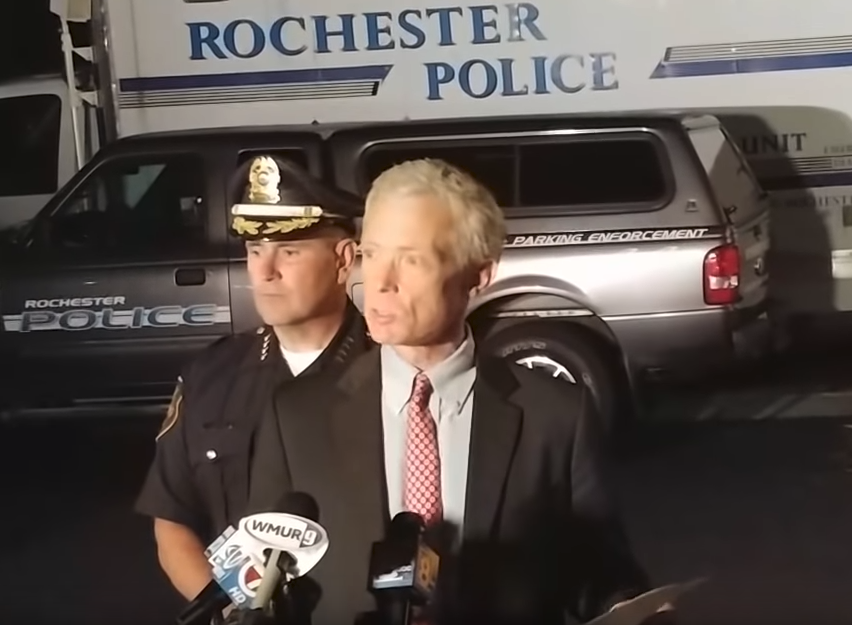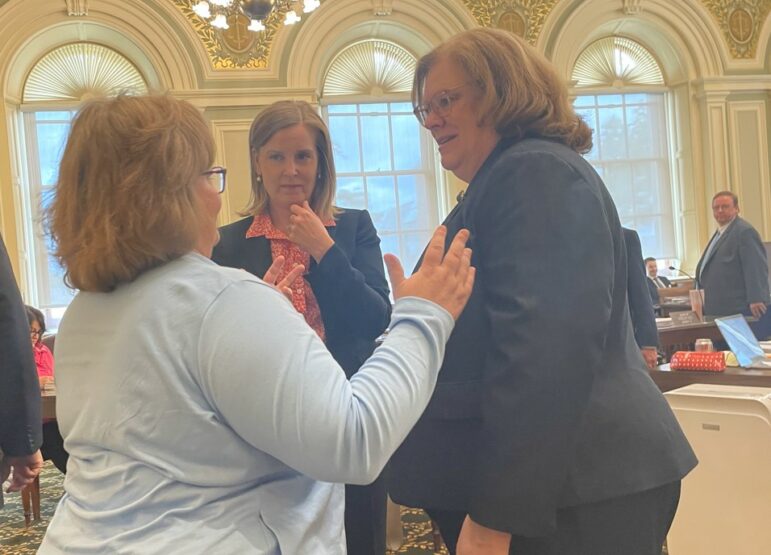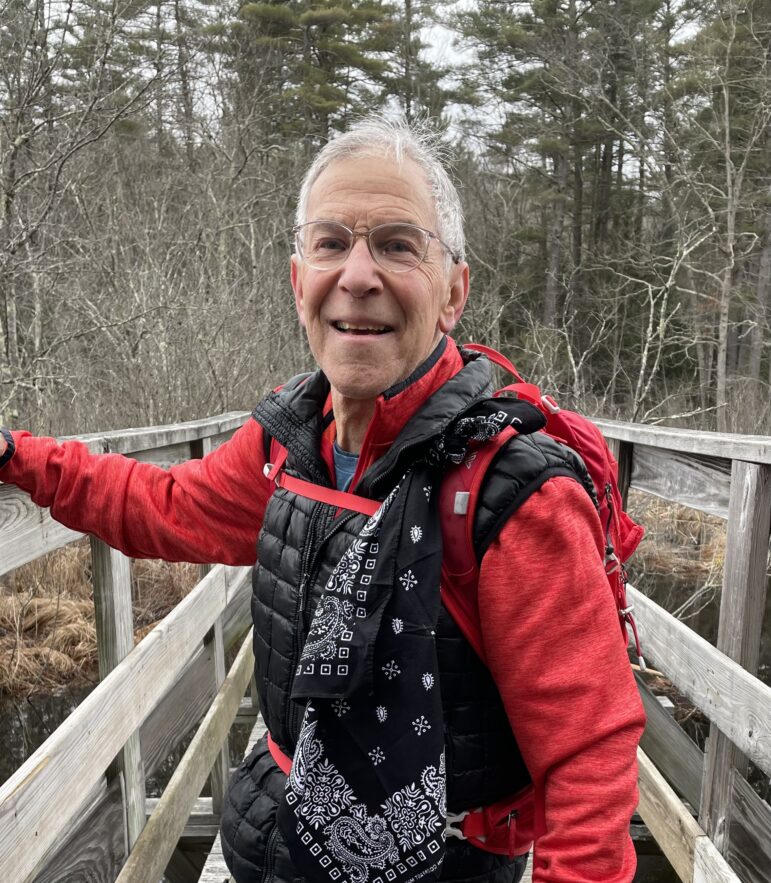By GARRY RAYNO, InDepthNH.org
CONCORD — The state’s legal community turned out in force to support the nomination of Attorney General Gordon MacDonald to be New Hampshire’s Supreme Court Chief Justice.
But so did those who believe he helped Gov. Chris Sununu overreach his constitutional authority in issuing and enforcing executive orders surrounding the COVID-19 pandemic.
Other concerns were raised over MacDonald’s association with conservative causes, particularly reproductive and privacy rights, and his office’s handling of voting issues.
Thursday’s public hearing on MacDonald’s nomination, is the second before the Executive Council. In 2019 his confirmation was rejected 3-2 when Democrats controlled the council, and the position has been vacant since that vote.
Sununu renominated MacDonald again earlier this month on the first day the governor and now Republican-controlled council were sworn into office.
MacDonald, who was in private practice until he was confirmed as Attorney General four years ago, reiterated his statement from his first hearing that his personal beliefs would not influence his decisions as a member of the state’s highest court.
“As a justice of the New Hampshire Supreme Court it will be my duty to uphold the law regardless of my personal beliefs and I will do so,” MacDonald said.
And he said if confirmed he would work to provide greater access to the courts for those who cannot afford legal representation.
“There is an access to justice gap, and I will do what I can to address this very important issue to the people of the state,” MacDonald said. “It’s complex and challenging, but we have the promise of access to the rule of law.”
Several former court chief justices attended the socially distanced and remote public hearing at the Department of Transportation facility.
Former Chief Justice John Broderick alluded to concerns about MacDonald’s lack of judicial experience and political activity including work for former U.S. Sen. Gordon Humphrey, serving on the New Hampshire campaigns of GOP Presidential candidates and as legal counsel to the Republican Party.
Broderick noted he did not have judicial experience when he was nominated by a Republican governor although he has been a lifelong Democrat, was co-chair of former President Bill Clinton’s two New Hampshire campaigns and was his party’s legal counsel.
But his work as a Democrat was never mentioned when he was confirmed to the Superior Court and later as to Chief Justice, he said.
“I took an oath and I took it seriously,” Broderick. “As chief justice, what you do is 80 percent of what every other justice does, 20 percent is as chief justice and most of that is administrative and Gordon has far more administrative experience than I had.”
“Gordon is one of the best lawyers I know,” the former chief justice said, “and he has enormous integrity, intelligence and character.”
But not everyone supported MacDonald, with many concerned about the actions of his office enforcing the governor’s mask mandate and other restrictions on state businesses to address the coronavirus pandemic.
Rep. David Love, R-Derry, as well as several other people testifying including District 5 Executive Councilor David Wheeler, R-Milford, questioned the attorney general’s involvement in the Binford versus Sununu court case challenging an executive order limiting public gatherings to 50 people or less.
Love said, “It is one thing to defend the constitution, but sending it out on a sabbatical for 10 months is wrong.”
The virus is infecting less than 1 percent of the state’s population, he said, but the executive orders are doing significant financial damage to small businesses and to have a state agency bullying small businesses is wrong.
He alluded to recent fines levied against small businesses for not enforcing the mask mandate or other violations of state guidances to prevent infections.
“I have serious reservations about that decision and opinion,” Love said.
District 1 Executive Councilor Joseph Kenney, R-Union, also raised issues related to restrictions due to the virus.
Businesses in my area are perplexed by decisions about who should enforce the guidance about masks, he said, and last week the attorney general got a little tougher on the mask mandate telling businesses to call law enforcement for a person in their store without a mask.
“There is some sense in the public that there is overreach by the executive Branch in the enforcement of the mask mandate,” Kenney said. “They have the sense their constitutionally guaranteed individual rights are being challenged.”
MacDonald said everyone in his office knows the economic consequences felt by citizens and businesses from the pandemic. Businesses have closed, employees have lost jobs and some businesses are hanging on by a thread, he said, noting the executive orders are public health orders and enforcement lies with the Department of Health and Human Services passed on to law enforcement.
MacDonald said he issued a memorandum to all law enforcement to use discretion and great care to protect public health, with the primary objection to inform and seek voluntary compliance.
But he noted that does not work in every instance and law enforcement has the ability to warn and to fine, but that has rarely been used.
Kenney asked MacDonald where the governor’s emergency powers originate saying they are intended to be temporary.
“My office does not make policy decisions,” he said, “it gives legal advice and enforces legal decisions.”
The legislature established emergency powers in two areas of law, certain facts have to be met and declarations may only last three weeks, he noted.
“Police power is inherent in a sovereign,” he said, ‘it’s necessary to protect and ensure the safety of our citizens.”
District 2 Executive Councilor Cinde Warmington, D-Concord, questioned MacDonald for more than an hour about his political involvement and most specifically women’s reproductive rights in light of the current members of the U.S. Supreme Court on Roe versus Wade.
MacDonald repeated that Roe versus Wade was settled law, but Warmington, an attorney, parsed his earlier statements and briefs on some key points.
She listed his political work and affiliations and his part in several bills sponsored by Humphrey to either limit or ban abortion.
MacDonald said he did not remember the legislation but noted his work was to help Humphrey refine his proposals,
But he said: “It is not relevant to my ability to be a judge. A judge is to set all personal beliefs aside.”
He said a judge should decide cases on facts and the law.
She asked him if the New Hampshire constitution provides greater privacy rights than the U.S. Constitution, and MacDonald was reluctant at first to give a definitive answer, but eventually agreed.
“Does New Hampshire’s right to privacy allow access to abortion services,” she said, and MacDonald declined to answer saying that issue may come before the New Hampshire Supreme Court. Earlier he cited guidance about hypothetical questions that could come before the court or the Ginsberg exception to answering questions about how nominees would rule in future cases.
Warmington noted there are six votes on the U.S. Supreme Court to overturn Roe vs. Wade, and if it is overturned, MacDonald would have no duty to uphold the original decision allowing abortion services.
“That is a hypothetical and I will not answer,” he said.
Warmintgon tried several other angles to draw out MacDonald’s opinion before he agreed if it were overturned there would be no federally protected right for women’s health care-decisions and it would be a matter for states to decide.
She also questioned MacDonald on same-sex marriage and voting laws.
Others were concerned about MacDonald’s office’s handling of election law including out-of-state college students voting and a recount of a November race that had a 300 vote differential in Windham.
Dr. David Strang of Gilmanton, said MacDonald has failed to act on the discrepancy and failed to inspect voting machines or the ballots despite repeated requests to do so.
Most of the letters sent to the Executive Council were in opposition to MacDonald’s nomination.
But the legal community came to praise him and his work as an attorney and head of the state’s legal department.
Along with Broderick, former Chief Justice Robert Lynn who is now a state representative, U.S. District Court Chief Judge Landya B. McCafferty of Portsmouth, retired U.S. First Circuit Judge Norman Stahl, who employed MacDonald as a law clerk, retired New Hampshire Supreme Court Judge Carol Ann Conboy and acting Attorney General Jane Young all supported MacDonald’s nomination.
“When he was nominated, I was thrilled,” Young told the Executive Council. “Few lawyers match his intellect, his drive or his sacrifice.”
And former Attorney General Kelly Ayotte also praised MacDonald and said he would be a great chief justice.
“I cannot think of a more qualified person to serve in this job so very important to the state,” Ayotte said. “It really is about his character, he is hardworking, diligent and he listens to people with different ideas and views.”
MacDonald graduated from Dartmouth College where he father was a professor and Cornell Law School.
He worked for the Manchester firm Nixon and Peabody for 15 years before Sununu chose him to be Attorney General.
The Executive Council has to vote on his confirmation before he becomes Chief Justice.
Garry Rayno may be reached at garry.rayno@yahoo.com.





